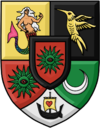Foreign relations of Sabia and Verona
| Sabia and Verona |
| This article is part of the series |
| Politics and government of Sabia and Verona |
| Constitution |
|---|
| Supreme Court |
| Electoral Commission |
| Foreign relations |
| History |
In the Kingdom of Sabia and Verona, foreign relations are the responsibility of the Diplomacy Division, a ministry of the government. The recognition of a foreign state must be approved by Parliament and ratified by the Monarch, who often plays an important role in the intermicronational development of the Kingdom, acting as its de facto representative abroad and as its top diplomat. However, the de jure "chief ambassador" of Sabia and Verona is its Diplomacy Secretary, presently Apollo Cerwyn.[1]
Sabia and Verona has been an independent nation ever since the signing of the Alios Agreement by King Tarik of Sabia and Verona and King Ciprian of Juclandia. Before the Alios Agreement, Sabia and Verona's foreign affairs were a responsibility of the Federal Goverment of the FUJL, of which the Kingdom was a province.[2]
Sabia and Verona and its various predecessor states have a long history of diplomacy with other micronations, particularly those of the MicroWiki sector. Some of Sabia and Verona's former incarnations have been founding members of intermicronational organizations, such as the Organisation of Micronational Ambient Protection in 2011 by the First Berinese Republic and the Union of South American Micronations, founded by the Union of Artaghe, which existed for a short period in 2012, months before the creation of Sabia and Verona. From April 2017 to December 2019, Sabia and Verona was an full member state of the Grand Unified Micronational. The Kingdom was previously an observer state of the organization.[3][4] Presently, the sole intermicronational forum in which Sabia and Verona participates is the Konmalehth.
Sovereignty disputes

Sabia and Verona's territory claims land de jure controlled by two macronational states: the Argentine Republic and the Bolivarian Republic of Venezuela. The Southern Territories of Sabia and Verona, consisting of the City of Alios (the capital of the Kingdom) and the Gonn Region, claim land in the Autonomous City of Buenos Aires, Argentina's capital city. The Northern Regions of Sabia and Verona, consisting of the "original" lands first claimed by the Kingdom at the moment of its foundation in 2012, and composed of the regions of Sabia, Verona and Lycem, are located in the Libertador Municipality, in Western Venezuela. This particular region of the Venezuelan West, located in the Chama River Valley, is known in Sabia and Verona as the Valtir Sector or Garrshirian sector.
The Government of Sabia and Verona doesn't recognize Argentina and Venezuela's sovereignty over these claimed areas, as it considers them to be part of Sabia and Verona's rightful, sovereign territory.
Recognized nations
Nations with which Sabia and Verona has signed a treaty of mutual recognition
 Karno-Ruthenian Empire, on 31 August 2015.a
Karno-Ruthenian Empire, on 31 August 2015.a Kingdom of Juclandia, on 28 February 2016.b
Kingdom of Juclandia, on 28 February 2016.b Principality of Lorenzburg, on 22 April 2016.[5]
Principality of Lorenzburg, on 22 April 2016.[5] Empire of Nedlando-Khorașan, on 11 May 2016 (ratified 14 May 2017).
Empire of Nedlando-Khorașan, on 11 May 2016 (ratified 14 May 2017). Kingdom of Jupiter, on 10 May 2017.
Kingdom of Jupiter, on 10 May 2017. Essian Commonwealth, on 6 June 2017.
Essian Commonwealth, on 6 June 2017. Abeldane Empire, on 18 June 2017.[6]
Abeldane Empire, on 18 June 2017.[6] Aarianian Union of North America, on 17 January 2018.
Aarianian Union of North America, on 17 January 2018. Empire of Austenasia, since 8 December 2019.[7]
Empire of Austenasia, since 8 December 2019.[7] Grand Duchy of Flandrensis, since 24 May 2020.[8]
Grand Duchy of Flandrensis, since 24 May 2020.[8]
a Treaty signed before the promulgation of the Alios Agreement.
b Sabia and Verona is in an economic and cultural union with Juclandia, the Federal Union of Juclandian Lands, which was reformed with the Alios Agreement on 28 February 2016.
Nations which maintain informal diplomacy with Sabia and Verona
 State of Zenrax, since 20 December 2016.
State of Zenrax, since 20 December 2016.
See also
- Diplomacy Division
- Federal Union of Juclandian Lands
- Foreign relations of Juclandia
- Government of Sabia and Verona
External links
References
- ↑ "Cerwyn government confirmed in marathonic inaugural session". The SiV Phonograph. 3 June 2019. Retrieved 17 May 2020.
- ↑ "Risen from ruins: the future of the Juclandian community". The SiV Phonograph. 28 February 2016. Retrieved 21 December 2016.
- ↑ "GUM accepts Sabia and Verona as full member". The SiV Phonograph. 17 April 2017. Retrieved 17 April 2017.
- ↑ "GUM Quorums: 11/12/16 – 2/1/17". Grand Unified Micronational. 3 January 2017. Retrieved 3 January 2017.
- ↑ Prins Frej (25 April 2016). "Lorenzburg and the Kingdom of Sabia and Verona establish diplomatic relations". Furstendömet Lorenzburg. Retrieved 21 December 2016.
- ↑ "Agreement of mutual recognition, non-aggression and friendship between the Abeldane Empire and the Commonwealth and the Kingdom of Sabia and Verona". Retrieved 18 May 2020.
- ↑ "Treaty of Mutual Recognition and Co-operation between the Empire of Austenasia and the Kingdom of Sabia and Verona". Retrieved 18 May 2020.
- ↑ @SabiaAndVerona on Twitter (24 May 2020). "We hail this treaty of friendship and mutual recognition with the Grand Duchy of Flandrensis..." Retrieved 24 May 2020.

